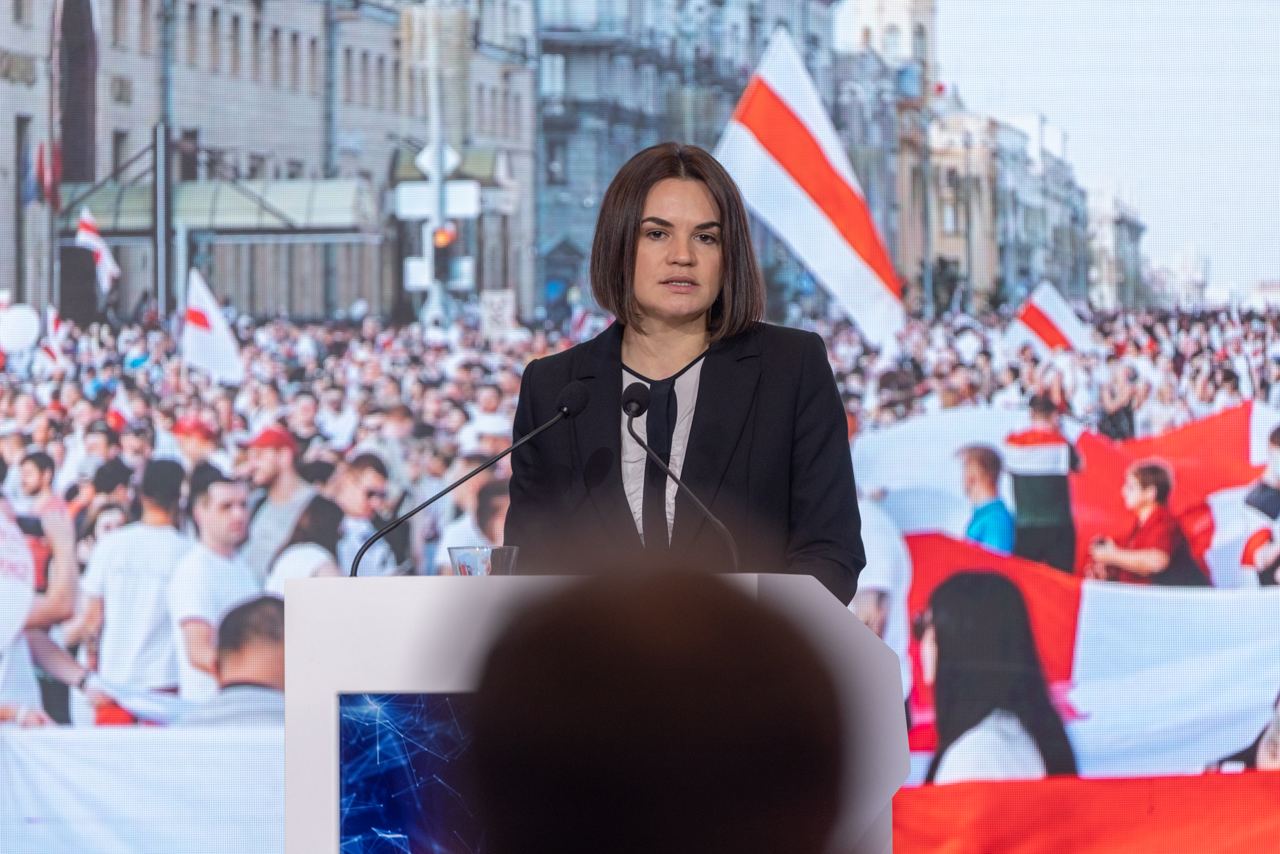“Ladies and gentlemen, dear friends,
I am pleased to visit Warsaw and speak at the Warsaw Security Forum. I met the President of Poland, Foreign Minister Rau, Ministers and Ambassadors of EU countries, and representatives of international organizations. I plan to meet the Office of the Prime Minister today, meet Belarusian diaspora, ByPOL, the Workers movement, and the Coordination Council. I am also meeting NGOs and institutions that work with Belarus.
Escalation of repression is a sign of fragility and insecurity of the regime. Several dozens of media outlets liquidated, 285 NGOs closed down, including the legendary Union of Writers which survived Stalin but not survived Lukashenka. The KGB is raiding the houses of ordinary citizens, it looks like we are back in the Stalin era, therefore we launched a non-violent resistance movement. Last week There were two more violent deaths during the KGB raid in Minsk followed by a massive wave of arrests. KGB detained 116 people for comments on Instagram and Youtube. We mourn with families of the killed and imprisoned.
The regime must face serious consequences for its crimes. We announce the campaign to launch an International tribunal to investigate the crimes of the regime, including crimes against humanity. I mentioned to minister Rau that Poland could spearhead this initiative as a country whose rights according to the Chicago and Montreal conventions were violated as a result of a hijacking of a Polish plane. Hundreds of repressed Belarusians fled to Poland where they received international protection. We believe that is sufficient grounds to initiate the investigation on the basis of violating the Convention against Torture. I also asked President Duda to accelerate opening cases under universal jurisdiction.
Yesterday, with the President of Poland I expressed to him my support in tackling the migration crisis. The regime in Belarus is fully responsible for orchestrating the crisis. It is revenge to Poland and Lithuania for their support of the Belarus democratic movement. With President Duda, we discussed further action, collaboration within the UN, and a strategy to make Lukashenka stop the crisis and pay for it.
Just yesterday there were 483 illegal attempts to cross the Belarusian-Polish border. And the numbers continue to grow. At least five migrants have died at the border to the date. However, as winter approaches, we are afraid that those singular deaths will grow into dozens. Only this week several planes full of innocent people, in fact, hostages of Lukashenka’s games, landed in Minsk, and after a few days will be delivered to the border and god knows what they are facing there.
People who are crossing the border are not guilty. They are victims used as a weapon by the terroristic regime. We know that there are from 10,000 to 15,000 migrants-hostages in Belarus already, and this number is reportedly growing. Many of them require medical aid, including pregnant, women, kids. The winter is coming.
I urge the UN and the world community to act to stop a humanitarian catastrophe that is about to happen in the middle of Europe. We need a reaction from the UN General Assembly and UN Security Council. The OSCE, where Poland becomes chairman next year, should make the Belarusian crisis a topic of its Ministerial Conference. We urged the Office of the High Commissioner for Human Rights and High Commissioner on Refugees to force the regime to stop the provocation, send a humanitarian mission to Belarus, and investigate the conditions those innocent people are put in.
We are working with the journalist community to shine the light on the schemes used by the regime to transport and attract them. We call on the governments where migrants originate to stop air travel with Belarus.
We should treat the problem, not the symptoms. We need to continue coordinated international pressure on the regime, primarily in the form of sanctions. I passed to the EU ministers our proposals on possible sanctions that hit the regime, not people. 55% of belarusians blame the regime for sanctions, not the West or Democratic forces. 41% of Belarusians see sanctions positively. It's crucial for Europe to stay united in its policy of economic, political, and diplomatic isolation of the regime.
However, I also stress the importance of building resilience in civil society. I urged the Polish officials to support Belsat TV, fund scholarships through the Kalinowski Program, and other organizations supporting Belarusians.
And important news. We are launching the online platform for civil society initiatives which will accumulate the energy and resources we have in the country and abroad. We are also creating a broad coalition of Belarus diaspora groups. 2 weeks ago I gathered representatives of 42 diaspora groups from 28 countries in Vilnius. We are in the process of regrouping our forces and strengthening the Coordination Council.
Today I will meet the organizations, NGOs, and think tanks that work with Belarus. My goal is to develop the mechanism of coordination to make sure we help people here and on the ground, and they receive the assistance needed. This mechanism must include both Belarusian organizations but also Polish and international initiatives.
We, as the democratic movement, are developing a vision for the future democratic Belarus. We are announcing a campaign “New Belarus” to show what Belarus after Lukashenko will look like. So when – not if – moment comes we will have 1) Programs of macro-aid 2) National investment plans 3) Reform proposals.
We should visualize the EU Comprehensive plan: what exactly will change in the life of each Belarusian. Thanks to Poland for initiating the plan. I asked multiple countries to contribute and propose investment plans for democratic Belarus after changes.
Thank you!”








